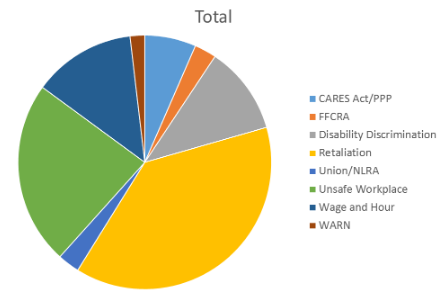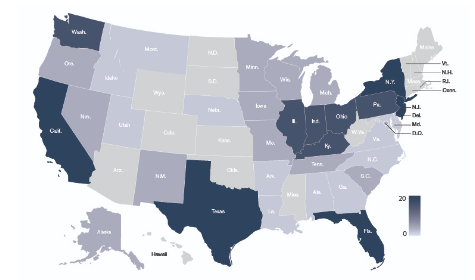BEWARE OF LAWSUITS COMING DOWN THE PIPELINE: Litigation FAQs Regarding COVID-19
As employees return to work, employers should be mindful of potential issues that may develop in light of the ongoing threat of COVID-19. Below are some helpful answers to questions you may have.
Can employees bring claims against me in connection with COVID-19?
Yes. Although the law with respect to COVID-19 is not yet developed, claims may form based on traditional principles of employment law. Examples of such claims include:
- Retaliation: for allegedly voicing concern over working conditions, using state and federal sick leave, making a workers’ compensation claim;
- Unsafe Working Conditions: for allegedly exposing the workforce to COVID-19 in an unsafe manner, failing to provide appropriate procedures, protocols, and equipment, failing to comply with state and federal guidance and orders relating to COVID-19;
- Discrimination: for allegedly failing to accommodate employees who claim the need for such an accommodation in connection with COVID-19, for adverse actions taken in response to a request for leave or other accommodation, for discriminating based on age, pregnancy, ethnicity or other protected categories in implementing return-to-work plans;
- Leave Claims: for allegedly failing to provide required state and federal leave relating to COVID-19; retaliating against employees for using or requesting such leave, interfering with employees’ abilities to use such leave;
- Wage and Hour: for allegedly failing to provide meal and rest breaks and/or overtime due to employees “working from home”, failing to pay for time spent undergoing pre-work health screenings and temperature checks;
- WARN Act: for allegedly failing to provide notification of mass layoffs and/or plant closings under the WARN Act when required;
- Other potential issues: Confidentiality of medical information if conducting health screenings or if receiving information that an employee has tested positive for COVID-19, workers’ compensation claims and retaliation claims for filing workers’ compensation claims, premises liability claims for COVID-19 related illnesses alleged to have been contracted at your place of business.
What types of claims have been filed around the country?
A review of court filings in the United States from late March 2020 through June 4, 2020 shows numerous employment lawsuits based on COVID-19–related claims that fall into the broad categories set forth in the following graph. Employment related claims are increasing at a rapid pace each week.

(natlawreview.com)
Are there “hot spots” for COVID-19 litigation popping up in certain areas of the country?
Yes. Hot spots of litigation activity related to employment-based COVID-19 claims are popping up in various parts of the country. At this time, the greatest number of claims are generally being filed in California, in states with larger rates of infection, and in states that have reopened quickly.

(natlawreview.com)
Can government agencies bring claims against me in connection with COVID-19?
Yes. The Occupational Safety and Health Administration (OSHA) has the duty and responsibility to investigate complaints and referrals from the general public relating to workplace safety. After conducting an investigation and/or inspection, OSHA also has the ability to cite you for safety violations. Between February 1, 2020 and June 17, 2020, OSHA received 6,113 COVID-19 related complaints and referrals, and state OSHA plans received 13,629, for a total of 19,742.
As with traditional employment law claims, employees can also bring COVID-19 related claims to the attention of agencies such as the Department of Fair Employment and Housing, the California Department of Labor Standards Enforcement, and the Equal Employment Opportunity Commission.
Has OSHA issued guidance regarding record-keeping and reporting requirements in connection with COVID-19?
Yes. OSHA has recently revised its previous enforcement guidance for the recording of COVID-19 cases. OSHA record-keeping requirements mandate covered employers to record certain work-related injuries and illnesses on their OSHA 300 log. Employers are only responsible for recording cases of COVID-19 if all of the following are true:
- The case is a confirmed case of COVID-19 (see CDC information on persons under investigation and presumptive positive and laboratory-confirmed cases of COVID-19);
- The case is work-related (as defined by 29 CFR 1904.5); and
- The case involves one or more of the general recording criteria set forth in 29 CFR 1904.7 (e.g., medical treatment beyond first aid, days away from work).
However, California’s OSHA standards require California to record COVID-19 cases if any of the following have occurred:
- Death;
- Days away from work;
- Restricted work or transfer to another job;
- Medical treatment beyond first aid;
- Loss of consciousness;
- A significant injury or illness diagnosed by a physician or other licensed health care professional.
If a work-related COVID-19 case meets one of these criteria, then covered employers in California must record the case on their 300, 300A and 301 or equivalent forms.
In addition to the record-keeping requirements discussed above, California employers must also report to Cal/OSHA any serious illness, serious injury or death of an employee that occurred at work or in connection with work within eight hours of when they knew or should have known of the illness.
A serious illness includes, among other things, any illness occurring in a place of employment or in connection with any employment that requires inpatient hospitalization for other than medical observation or diagnostic testing. This means that if a worker becomes ill while at work and is admitted as in-patient at a hospital, regardless of the duration of the hospitalization, the illness occurred in a place of employment, so the employer must report this illness to the nearest Cal/OSHA office. Reports must be made immediately, but not longer than eight hours after the employer knows or with diligent inquiry would have known of the serious illness.
Moreover, reportable illnesses are not limited to instances when the employee becomes ill at work. Serious illnesses include illnesses contracted “in connection with any employment,” which can include those contracted in connection with work but with symptoms that begin to appear outside of work. An employer should report a serious illness if there is cause to believe the illness may be work-related, regardless of whether the onset of symptoms occurred at work.
For COVID-19 cases, evidence suggesting transmission at or during work would make a serious illness reportable. An employer should consider factors such as:
- Multiple cases in the workplace;
- The type, extent and duration of contact the employee had at the work environment with other people, particularly the general public;
- Physical distancing and other controls that impact the likelihood of work-related exposure;
- Whether the employee had work-related contact with anyone who exhibited signs and symptoms of COVID-19;
Even if an employer cannot confirm that the employee contracted COVID-19 at work, the employer should report the illness to Cal/OSHA if it results in in-patient hospitalization for treatment and if there is substantial reason to believe that the employee was exposed in their work environment. Where there is uncertainty about whether an employee contracted COVID-19 at work, the employer should err on the side of reporting the illness to Cal/OSHA.
Can an employee bring a claim against me for violating OSHA standards?
No. OSHA does not create a private right of action that would allow employees to sue you for COVID-19 related issues caused by an alleged violation of OSHA standards. However, evidence of OSHA violations may be admissible as evidence in lawsuits instituted by employees as set forth above. In certain lawsuits, evidence of an OSHA violation can be admissible as evidence of negligence.
How can I reduce the risk of employees or government agencies bringing COVID-19 related claims against me?
- Review your COVID-19 workplace safety plan. Ensure that all employees have been instructed on the plan and are in compliance with the plan. Ensure that there is timely investigation and resolution of any reported concerns. Document the investigation process and outcome.
- If conducting temperature checks and other health screenings, ensure that you have procedures and protocols to maintain employee privacy and confidentiality of medical information, as well as to protect both the employee being screened and the employee performing the screening.
- Familiarize yourself and your employees with your policies against harassment, discrimination, and retaliation. Ensure that you are knowledgeable about the FMLA, the Emergency Paid Sick Leave Act and the Emergency Family and Medical Leave Expansion Act under the FFCRA.
- Ensure that any and all requests for accommodation related to COVID-19 are addressed through an interactive process and that reasonable accommodations are provided. Document the process and the outcome.
- Comply with all state guidelines and CDC recommendations with respect to the operation of your business.
- If employees express any concerns in connection with COVID-19 at your workplace, communicate with the employee about their specific concerns and engage in a dialogue to resolve the issues.
If you have any questions regarding the foregoing information please do not hesitate to reach out.
 |
 |
| ERICA M. SOROSKY esorosky@ptwww.com (949) 851-7271 |
ERIN K. OYAMA eoyama@ptwww.com (949) 851-7288 |

